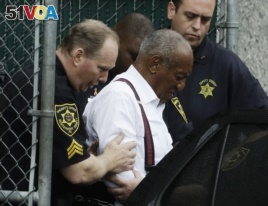04 August 2020
The term "cancel culture" is appearing in the news a lot lately.
But what exactly is "cancel culture?"
Here are some explanations, gathered by the Associated Press, from people who have been writing about the issue.
Writer and reporter George Packer has explained that it is an event where many voices, mostly on social media, try "to silence a point of view that they find offensive by trying to damage or destroy the reputation of the person who has given offense."
Tressie McMillan Cottom has a different opinion. "I don't think it's real. But there are reasonable people who believe in it," the writer and educator said. "Accountability has always existed. But some people are being held accountable in ways that are new to them."
It "[takes] away the ability of a person with whom you disagree to ever be taken seriously as a writer/editor/speaker/activist/intellectual, or... to be hired or employed," says Letty Cottin Pogrebin. She is an activist and founding editor of Ms. magazine.
In tweets, online letters, opinion pieces and books, people from every political point of view are angry about what they consider a growing intolerance for other opinions. A Politico/Morning Consult public opinion study released last week shows 44 percent of Americans disapprove of it, 32 percent approve and the remaining 24 percent had no opinion or said they did not know what it was.
There are recent examples of unpopular "cancellations." They include reports of what happened to the owner of several Minneapolis food stores. His business was threatened with boycotts after his daughter wrote words on social media that were offensive.
A data expert was fired by the company Civis Analytics after he tweeted a study finding that nonviolent protests increase support for Democratic candidates and violent protests decrease it. Civis Analytics has denied he was fired for the tweet.
These events "damage the lives of innocent people" and have little purpose, Yascha Mounk wrote in the magazine The Atlantic last month. Mounk has been criticized for saying that many educated, important people are saying it is acceptable to give up on values like due process and free speech."
Discussions can be confusing however. Those who do not like intolerance can be unhappy with those who do not agree. A few weeks ago, more than 100 artists and thinkers signed a letter co-written by Packer and published by Harper's. It warned against big thinking that weakens free and open discussion and demands conformity of thought.
The letter was signed by many people with different political ideas, from far-left Noam Chomsky to the conservative David Frum.
The writer and trans activist Jennifer Finney Boylan, who signed the letter, quickly disowned it because she "did not know who else" had signed their names. Salman Rushdie was one of the signers. In 1989, he was forced into hiding. Rushdie received death threats from Iranian Islamic leaders because he had written a novel called "The Satanic Verses." Some online critics said the letter was from self-important people who knew nothing about censorship.
One of the organizers of the letter, the writer Thomas Chatterton Williams, later wrote about an incident on Twitter. He wrote that he had asked a guest to leave his home after an argument over Bari Weiss. Weiss is the former New York Times writer who quit over what she called political correctness at the newspaper.
"The only speech these powerful people seem to care about is their own," the feminist writer Jessica Valente wrote about the Harper's letter.
It "is certainly not about free speech...‘canceled' is a label we all understand, a powerful person who's been held to account," she wrote.

FILE - Bill Cosby departs after his sentencing hearing at the Montgomery County Courthouse, Sept. 25, 2018, in Norristown, Pennsylvania.
Hard to define
However, "cancel culture" remains hard to define because it appears to have no limits. It has no single cause, ideology or punishment.
Movie producer Harvey Weinstein and actor Bill Cosby were convicted of sex crimes and are in prison. Actor Kevin Spacey was accused of sex crimes. He was not been convicted but has made no movies since he faced trial.
Others people are only "canceled" a little. Movie director Woody Allen was accused of sexual abuse by his daughter Dylan Farrow. His business deal with Amazon was cancelled. But, he continues to release movies internationally. He recently published a book about his life.
But what about politicians?
"Politicians can ride this out...if the public is willing to go along, then they can sometimes survive things perhaps they shouldn't survive," Packer says.
I'm Susan Shand.
The Associated Press reported this story. Susan Shand adapted it for Learning English. Mario Ritter, Jr. was the editor.
________________________________________________________________
Words in This Story
point of view –phrase. a way of looking at or thinking about a subject
reputation–n. the common opinion that people have about someone
accountability–n. the degree to which someone is held accountable for something
intolerance–n. a lack of willingness to permit or accept something
due process –n.(legal)the requirement that the rules in a legal case must protect the rights of all the people involved
conformity–n. behavior that is the same as most other people in a society or group
censorship–n. the process of removing opinions from books, movies, letters and other media
feminist–adj. something related to feminism, a movement which seeks to support women's rights and interests
ideology–n. a set of ideas and beliefs of a group or political party